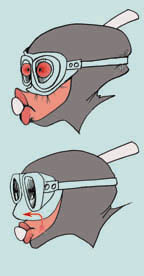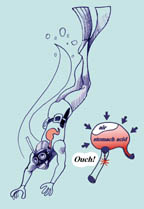
Freedive!
CHAPTER
EXCERPTS
|
 |
FREEDIVE!
by Terry Maas and David SipperlyPhysiology
part II

In this chapter, we'll examine the effects of water pressure on
your body and gear. The density and weight of water has profound effects on your body.
Understanding the physiology of pressure and ways to cope with it are fundamental to
successful freediving.
Direct Effects of Water Pressure
Saltwater exerts a pressure of 14.7-pounds-per-square-inch (psi) for every 33 feet (10
meters) of saltwater. Every 33 feet is equivalent to the weight of our entire atmosphere,
so we commonly refer to each 33 feet of saltwater as one atmosphere of pressure. For
example, when you descend to a depth of 33 feet, you will have a total of two atmospheres
(29.4 psi) compressing your body-one atmosphere of air and one of water. This total
pressure is referred to as absolute pressure. Your depth-gauge reads only water pressure.
In physics, there is a gas law that explains pressure and volume relationships. Called
"Boyle's Law," this concept is important to understand because it helps explain
why you feel pain in your ears at the bottom of a swimming pool or why your wetsuit loses
buoyancy in deep water. Boyle's Law states that the volume of any gas is inversely
proportional to the absolute pressure. This means that as the external pressure increases
on a volume of gas, it will compress that volume, by packing gas molecules closer
together. Let's look at an example.
If your lungs had 6 liters of air in them at the surface and you then dove to 33 feet (10
meters), the volume of your lungs would be reduced by half of its surface volume (3
liters). This air did not escape; rather, the gas molecules compressed together causing
the density of that air to double..............
Because most of your body is made of non-compressible fluids,
you’ll feel the force of increasing pressure primarily in the air cavities of your
head and chest. Generally, the first sign of increasing water <d>pressure is pain in
your ears. We call these pressure-induced changes in air cavities “squeezes.”
Divers must contend with ear, chest and mask squeezes. “Equalization” or
“clearing” are terms used for the supplying of pressure from your lungs, throat
and mouth to offset, or balance, external water pressure. Equalization pressure returns
eardrums, sinus walls and masks to their former shape..........
Middle-ear squeeze
Of the three kinds of ear squeeze-internal, external and middle-ear-it's the middle-ear
squeeze that's most common. In fact, it's probably the single biggest cause of freediver
dropout. As increasing water pressure forces your eardrums and sinus walls in, you feel
pain. If you don't correct this squeeze early in the dive, you may suffer a ruptured
eardrum-it's possible to injure yourself in water just 4 feet (1 meter) deep. Unlike scuba
divers, who have minutes to equalize their ears and may need to equalize only several
times a day, the freediver has just seconds to clear his ears and may need to clear them
hundreds of times a day. Because of problems with ear anatomy and/or soft tissue responses
to chronic allergy, some individuals will never be able to freedive.
An important segment of your ear-clearing anatomy is the eustachian tube. Its proper
function is critical to successful ear clearing. For freediving, the ideal eustachian tube
would be a wide-open, straight passage to the ear. Unfortunately, it's neither. Curving
upward, this air duct is lined with the same mucous membrane that covers your throat-the
very same mucous membrane that swells with allergies or colds. To equalize your ears, you
seal your nose by pushing the bottom of the nose pocket against your nostrils (don't
pinch) and gently blowing to force air through an open eustachian tube into your middle
ear.....................
Inner-ear squeeze
Your inner ear processes vibrations, transmitted through your eardrum, into sound. It also
contains your organ of balance. Separating the air-filled middle ear from the fluid-filled
inner ear is a thin membrane called the "round window." Rupture of your round
window has serious consequences-deafness, debilitating dizziness, nausea and vertigo.
The round window can rupture inward or outward depending on the direction of force applied
to it. It ruptures inward when you clear forcefully. Outward rupture occurs when you fail
to clear your ears. In an attempt to equalize the pressure gradient between the middle ear
and the inner ear, inner-ear fluid breaks the round window and leaks into the middle
ear................

Heartburn, or pain in your esophagus, can be a problem for
freedivers, especially those prone to this condition. Normally, a valve at the top of the
stomach confines the acids of digestion below the esophagus. When these acids leak upward,
out of the stomach, they burn the esophagus.
Freediving aggravates this condition for several reasons. Simple immersion increases
pressure on the stomach by about four times and distorts the stomach-esophagus valve so
that it leaks more easily. The unfavorable effects of gravity when you’re floating or
diving downward makes matters worse. Novices, using improper ear-clearing techniques, may
swallow air, which also interferes with the stomach-esophagus valve.
You can prevent heartburn by......................... |

